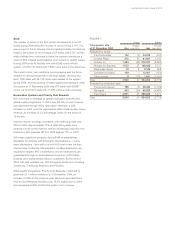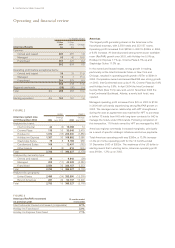Holiday Inn 2004 Annual Report Download - page 16
Download and view the complete annual report
Please find page 16 of the 2004 Holiday Inn annual report below. You can navigate through the pages in the report by either clicking on the pages listed below, or by using the keyword search tool below to find specific information within the annual report.
The Group will be required to produce its first set of audited
financial statements in line with International Financial Reporting
Standards (‘IFRS’) for the year ending 31 December 2005. This
will require an opening balance sheet to be prepared under IFRS
as at 1 January 2004, and a full profit and loss account, balance
sheet and cash flow statement for the year ended 31 December
2004 for comparative purposes.
The transition to IFRS reporting will result in a number of changes
in the presentation of reported financial statements, notes thereto
and accounting principles.
Historically, the Group financial statements have been prepared
in accordance with accounting principles generally accepted in
the United Kingdom (UK GAAP). The following explanatory notes
and reconciliations describe the differences between IFRS and
UK GAAP reporting for the financial year 2004 as well as for the
IFRS opening balance sheet at 1 January 2004. The comparative
figures are presented in accordance with UK GAAP, and are
identical to the full year information disclosed previously.
The following financial information should be read in conjunction
with ‘IFRS accounting policies’ below which describe the IFRS
policies followed by the Group.
The effects of the transition are explained on the following pages
which include balance sheet reconciliations at the date of
transition and at 31 December 2004 and a reconciliation of the
profit and loss account for the year ending 31 December 2004.
IFRS accounting policies
BASIS OF ACCOUNTING
The financial statements are prepared in accordance with
International Financial Reporting Standards (IFRS).
The financial statements are prepared on an historic cost basis,
except for certain items of property, plant and equipment held at
deemed cost under the transitional rules of IFRS.
The principle IFRS accounting policies of the Group are set out
below.
FIRST TIME ADOPTION OF IFRS
The Group has adopted IFRS from 1 January 2004 (‘date of
transition’) with the exception of IAS 32 ‘Financial Instruments:
Disclosure and Presentation’ and IAS 39 ‘Financial Instruments:
Recognition and Measurement’, which are adopted with effect
from 1 January 2005 in accordance with the requirements of
IFRS 1 ‘First-time Adoption of International Financial Reporting
Standards’.
In accordance with IFRS 1, the Group is entitled to a number of
voluntary and mandatory exemptions from full restatement, which
have been adopted as follows:
Business combinations The basis of accounting for pre-transition
combinations under UK GAAP has not been revisited. The initial
carrying amount of assets and liabilities acquired in such
business combinations is deemed to be equivalent to cost.
Property, plant and equipment The Group has elected to retain
UK GAAP carrying values of freehold and leasehold hotels
including revaluations as deemed cost at transition.
Employee benefits The cumulative actuarial gains and losses on
defined benefit pension schemes and similar post-retirement
benefits at transition date have been recognised in full in equity.
Foreign currencies The Group has elected not to recognise
separately cumulative foreign exchange movements up to the
transition date, and from 1 January 2004 onwards, to recognise
foreign exchange differences on the retranslation of foreign
subsidiaries in a separate reserve within equity.
Share-based payments IFRS 2 ‘Share-based Payment’ has been
applied to all grants of equity instruments after 7 November 2002
that had not vested at 1 January 2005.
NEW ACCOUNTING POLICIES
The Group has adopted the transitional requirements of IFRS 5
‘Non-current Assets Held for Sale and Discontinued Operations’
and IFRS 2 ‘Share-based Payment’ from 1 January 2004.
BASIS OF CONSOLIDATION
The Group financial statements comprise the financial statements
of the Company and entities controlled by the Company.
The results of those businesses acquired or disposed of are
consolidated for the period during which they were under the
Group’s control.
INVESTMENT IN ASSOCIATES
An associate is an entity over which the Group has the ability to
exercise significant influence, but not control, through participation
in the financial and operating policy decisions of the entity.
Associates are accounted for using the equity method, unless the
investment is held for sale (see below). Using the equity method,
the Group’s investment is recorded at cost adjusted by the
Group’s share of post acquisition profits and losses.
ASSETS HELD FOR SALE
Assets and liabilities are classified as held for sale when their
carrying amount will be recovered principally through a sale
transaction, rather than continuing use, and a sale is highly
probable.
International financial reporting information
14 InterContinental Hotels Group 2004
























